Abstract
During 1972 a large epidemic, in excess of 10,000 cases, of typhoid fever occurred in Mexico City, Pachuca, and other communities of Mexico. The main characteristic of the epidemic, in addition to the large number of persons affected, was the prevalence of a strain of Salmonella typhi which was highly resistant to chloramphenicol both in vivo and in vitro, and which belonged to a single phage type, Vi degraded approaching type A. Of 493 strains of S. typhi studied during the outbreak, 452 (91.7%) were resistant to chloramphenicol (CM), tetracycline (TC), streptomycin (SM), and sulfonamides (SU). The epidemic strain owes its resistance to an R factor which is easily transferable to Escherichia coli K-12 and which appears to be stable. In the third month of the outbreak, a strain of S. typhi resistant to CM, TC, SM, SU, ampicillin (AM), and kanamycin (KM) was isolated from a patient with severe typhoid fever. During the following 9 months, six additional strains of S. typhi resistant to AM, CM, TC, SM, and SU were also isolated. Transfer experiments to E. coli K-12 indicate that these strains are infected with two different R factors, one causing CM, TC, SM, and SU resistance and the other causing AM or AM and KM resistance. The frequency of transfer of the resistance in overnight crosses was in the order of 10−4 for CM, TC, SM, and SU and 10−6 for AM or AM, and KM. The appearance of these strains resistant both to chloramphenicol and ampicillin was a cause for concern for the clinicians; fortunately, they have remained an infrequent cause of disease.
Full text
PDF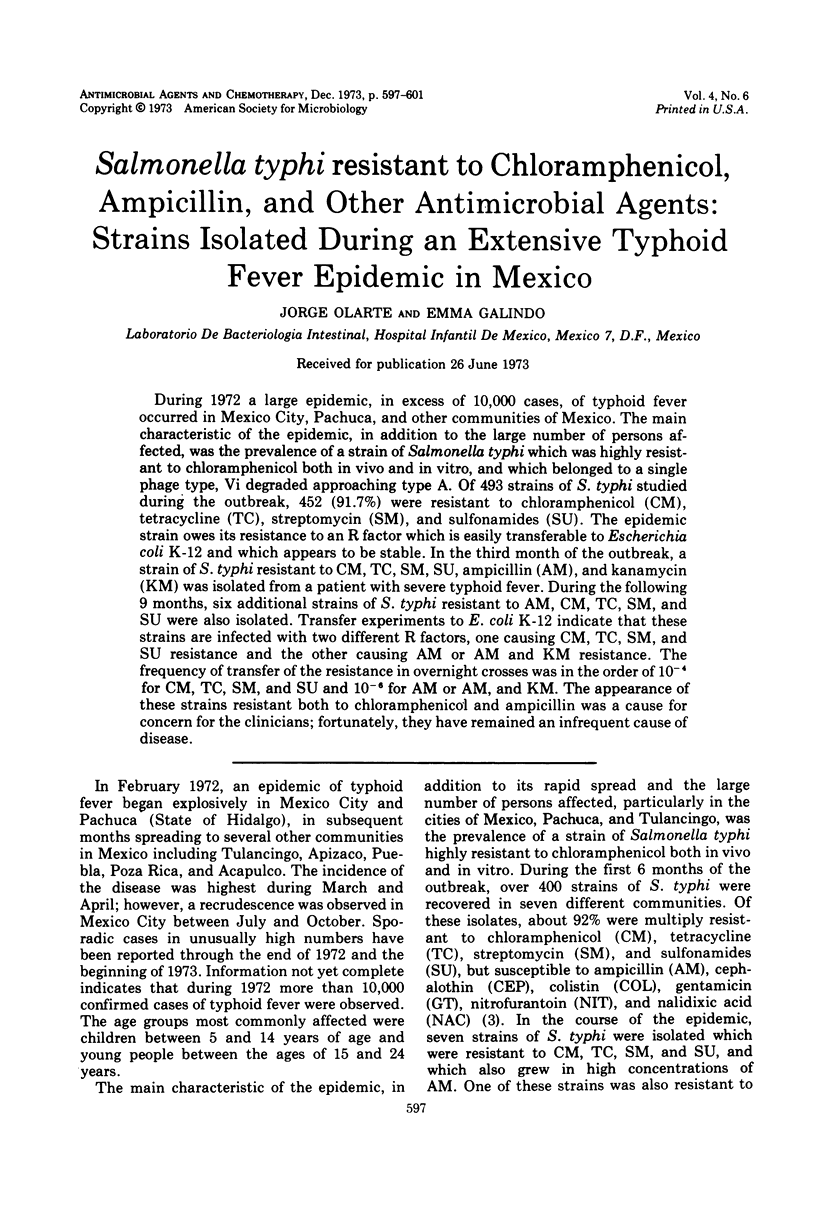
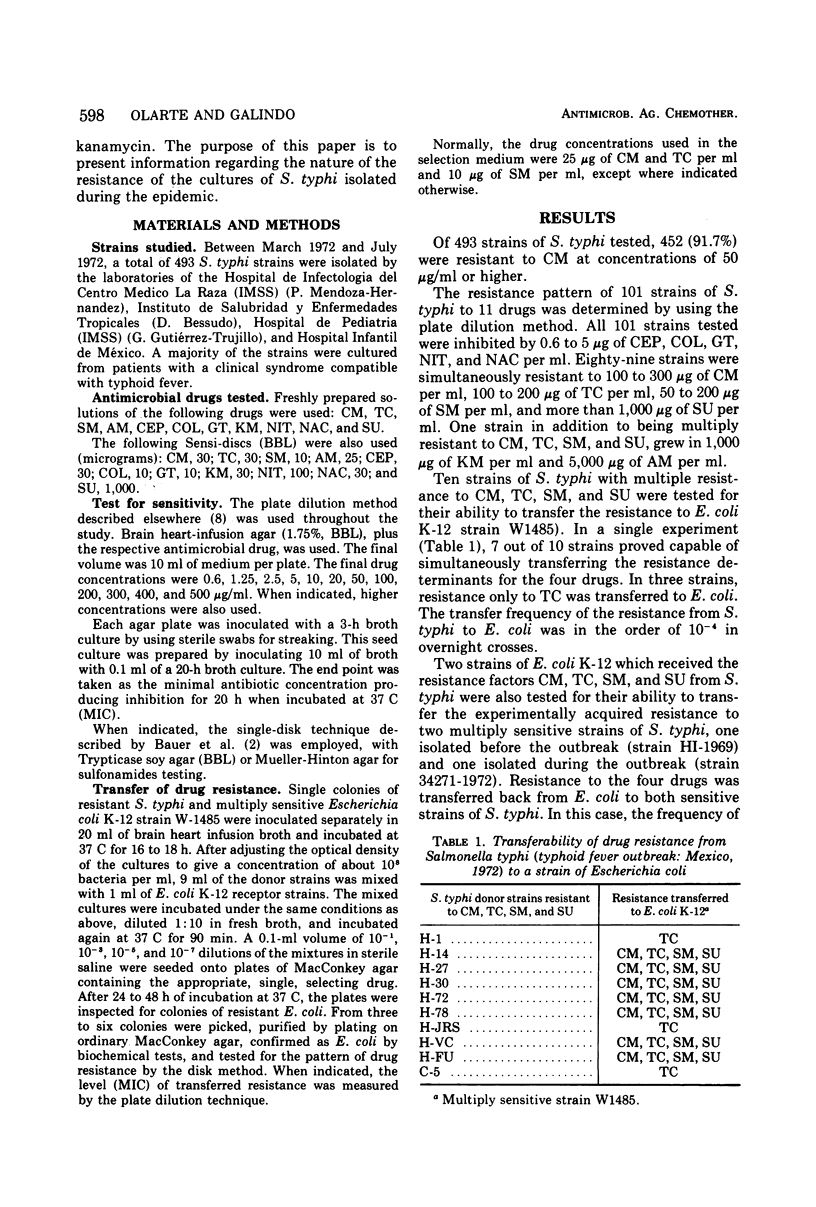
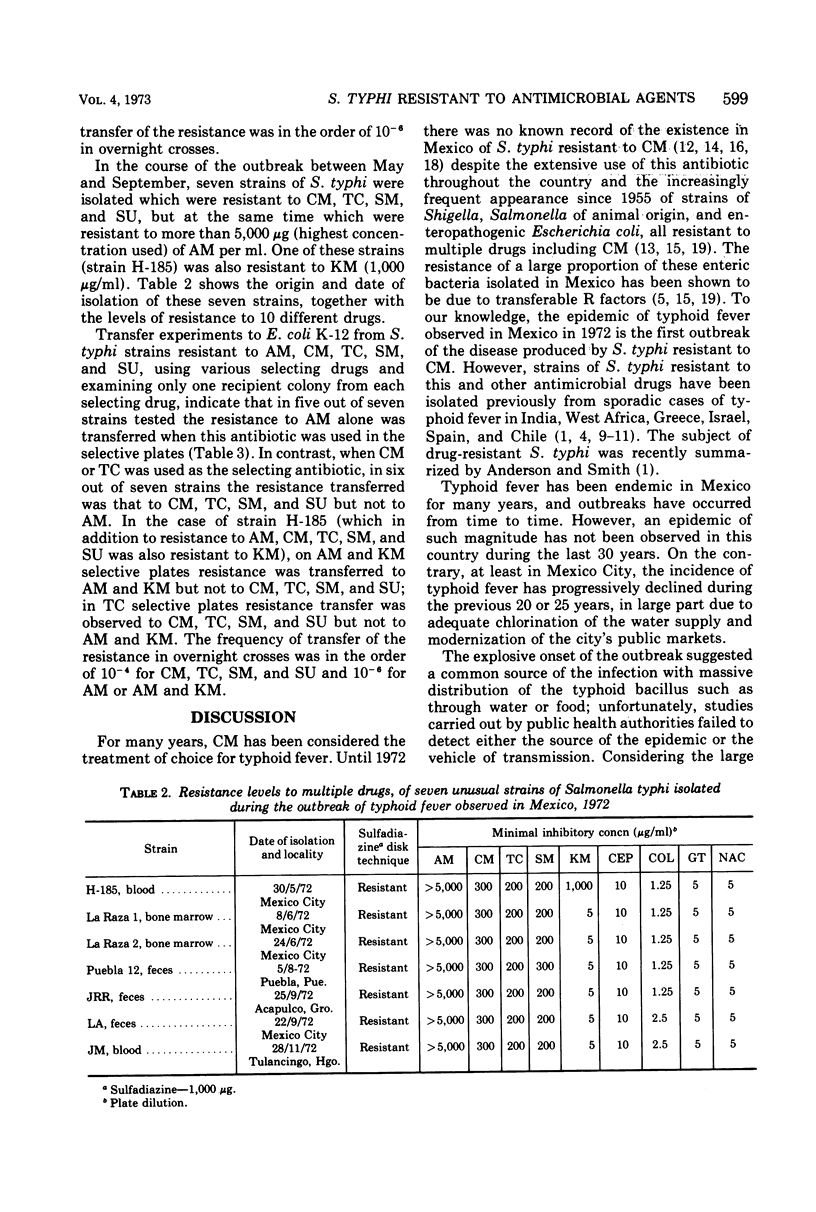
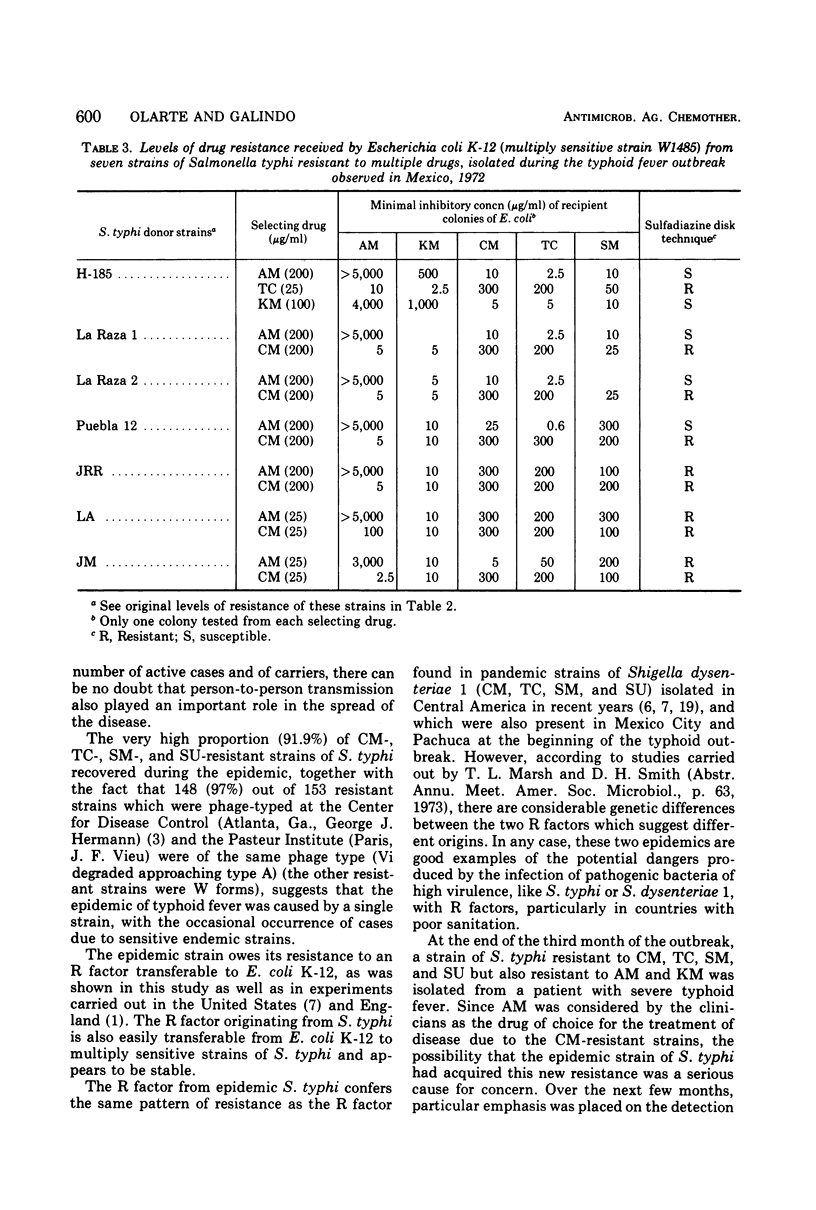
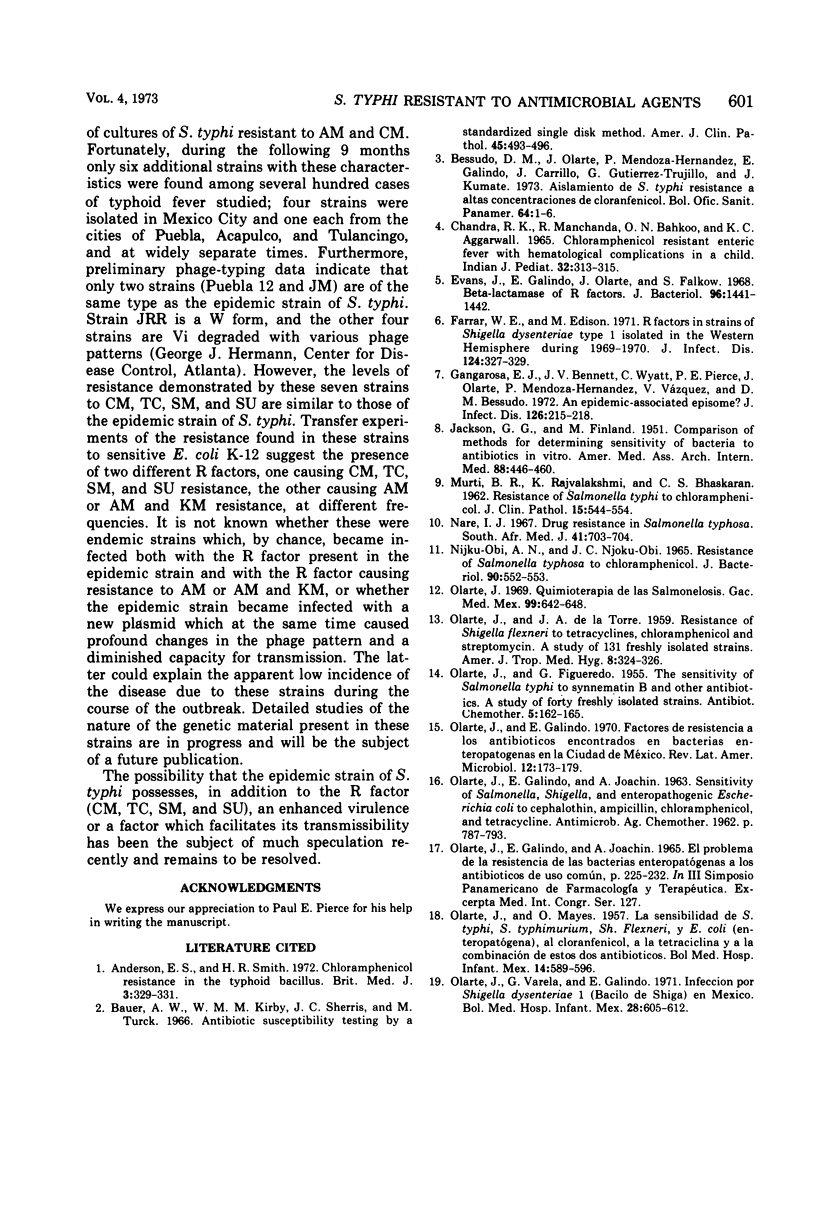
Selected References
These references are in PubMed. This may not be the complete list of references from this article.
- Anderson E. S., Smith H. R. Chloramphenicol resistance in the typhoid bacillus. Br Med J. 1972 Aug 5;3(5822):329–331. doi: 10.1136/bmj.3.5822.329. [DOI] [PMC free article] [PubMed] [Google Scholar]
- Bauer A. W., Kirby W. M., Sherris J. C., Turck M. Antibiotic susceptibility testing by a standardized single disk method. Am J Clin Pathol. 1966 Apr;45(4):493–496. [PubMed] [Google Scholar]
- Bessudo D., Olarte J., Mendoza-Hernández P., Galindo E., Carrillo J., Gutiérrez-Trujillo G., Kumate J. Aislamiento de S. typhi resistente a altas concentraciones de cloranfenicol. Bol Oficina Sanit Panam. 1973 Jan;74(1):1–6. [PubMed] [Google Scholar]
- Chandra R. K., Manchanda R., Bahkoo O. N., Aggarwal K. C. Chloramphenicol-resistant enteric fever with hematological complications in a child. Indian J Pediatr. 1965 Oct;32(213):313–315. doi: 10.1007/BF02812767. [DOI] [PubMed] [Google Scholar]
- Evans J., Galindo E., Olarte J., Falkow S. Beta-lactamase of R factors. J Bacteriol. 1968 Oct;96(4):1441–1442. doi: 10.1128/jb.96.4.1441-1442.1968. [DOI] [PMC free article] [PubMed] [Google Scholar]
- Farrar W. E., Jr, Eidson M. R factors in strains of Shigella dysenteriae type 1 isolated in the western hemisphere during 1969-1970. J Infect Dis. 1971 Sep;124(3):327–329. doi: 10.1093/infdis/124.3.327. [DOI] [PubMed] [Google Scholar]
- Gangarosa E. J., Bennett J. V., Wyatt C., Pierce P. E., Olarte J., Hernandes P. M., Vázquez V., Bessudo D. An epidemic-associated episome? J Infect Dis. 1972 Aug;126(2):215–218. doi: 10.1093/infdis/126.2.215. [DOI] [PubMed] [Google Scholar]
- JACKSON G. G., FINLAND M. Comparison of methods for determining sensitivity of bacteria to antibiotics in vitro. AMA Arch Intern Med. 1951 Oct;88(4):446–460. doi: 10.1001/archinte.1951.03810100030003. [DOI] [PubMed] [Google Scholar]
- MURTI B. R., RAJYALAKSHMI K., BHASKARAN C. S. Resistance of Salmonella typhi to chloramphenicol. I. A preliminary report. J Clin Pathol. 1962 Nov;15:544–551. doi: 10.1136/jcp.15.6.544. [DOI] [PMC free article] [PubMed] [Google Scholar]
- NJOKU-OBI A. N., NJOKU-OBI J. C. RESISTANCE OF SALMONELLA TYPHOSA TO CHLORAMPHENICOL. J Bacteriol. 1965 Aug;90:552–553. doi: 10.1128/jb.90.2.552-553.1965. [DOI] [PMC free article] [PubMed] [Google Scholar]
- OLARTE J., DE LA TORRE J. A. Resistance of Shigella flexneri to tetracyclines, chloramphenicol and streptomycin; a study of 131 freshly isolated strains. Am J Trop Med Hyg. 1959 May;8(3):324–326. doi: 10.4269/ajtmh.1959.8.324. [DOI] [PubMed] [Google Scholar]
- OLARTE J., MAYES O. La sensibilidad de S. typhi, S. typhimurium, Sh. flexneri y E. coli (enteropatógeno), al cloranfenicol, a la tetraciclina y a la combinación de estos dos antibióticos. Bol Med Hosp Infant Mex. 1957 Dec 1;14(6):589–596. [PubMed] [Google Scholar]
- Olarte J. Adelantos en quimioterapia. II. Quimioterapia de las salmonelosis. Gac Med Mex. 1969 Jul;99(7):642–648. [PubMed] [Google Scholar]
- Olarte J., Galindo E. Factores de resistencia a los antibióticos encontrados en bacterias enteropatógenas aisladas en la ciudad de México. Rev Latinoam Microbiol. 1970 Jul-Sep;12(3):173–179. [PubMed] [Google Scholar]


